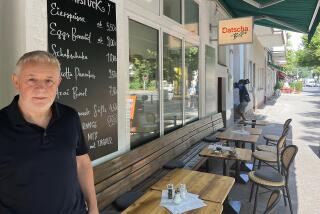German Region on Volga River to Be Revived
- Share via
MOSCOW — Russia and Germany signed a treaty Friday allowing ethnic Germans to resettle on the Volga River, where an autonomous German republic existed until dictator Josef Stalin destroyed it during World War II.
The treaty will re-establish an autonomous region open to all ethnic Germans in the former Soviet Union. It was signed by Russian Deputy Prime Minister Valery Makharadze, Nationality Policy Minister Valery Tishkov and Bonn’s special envoy for ethnic Germans, Horst Waffenschmidt.
About 2 million ethnic Germans still live in the former Soviet Union, mainly in Russia and the Central Asian republic of Kazakhstan, where they were deported in 1941. Many would like to go to Germany, but others say they would stay if a special region were set aside for them.
Germany is flooded with refugees and would like to discourage further immigration. But the German constitution mandates that every ethnic German is eligible for German citizenship.
Bonn has said it is willing to support ethnic Germans in the former Soviet Union and has given $87 million to ethnic Germans in Russia in the past two years. Under the new treaty, Russia also is obliged to provide financial support to resettled Germans.
In March, Ukraine established a program for resettling ethnic Germans who were deported from Ukrainian lands.
Thousands of Germans came to Russia in the early 18th Century at the invitation of Peter the Great, who sought teachers, doctors, architects and engineers to help modernize his country.
The Germans were grouped into the German Autonomous Republic on the lower Volga from 1924 to 1941 but were sent to Kazakhstan and Siberia during World War II.
More to Read
Sign up for Essential California
The most important California stories and recommendations in your inbox every morning.
You may occasionally receive promotional content from the Los Angeles Times.









